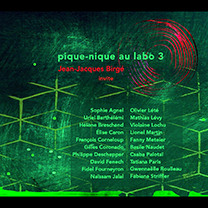|
|
|
|
Music Reviews from the Staff of the Poison Pie Publishing House
|
|
September 30, 2023
pique-nique au labo 3 - Jean-Jacques Birgé
 Label: GRRR & (bandcamp)
Label: GRRR & (bandcamp)
Catalog #: GRRR 2036
Country: France
Release Date: September 11, 2023
Media: cd & digital files
bandcamp.com entry
discogs.com entry
pique-nique au labo 3 is the third installment (the first two being released together as a double cd) in the musical laboratory of French composer and improviser, Jean-Jacques Birgé. The nature of the experiment is succinctly described as follows: "It is about playing to meet and not the other way around as is usual", i.e. meeting to play.
These musical dialogues and trialogues capture the conversation as it arose in the gathering of the musicians. Because the initial meeting of musicians by definition lacks a history of rehearsal, one might be predisposed to think that the resulting music should be raw, tentative and susceptible to awkward silences. This supposition is only partially correct and then likely for the wrong reasons. At its best, this approach to the music seeks the raw and spontaneous reaction that arises in first meetings of individuals, as each gradually discovers the nature of the other. Any awkwardness is alleviated by the discipline of the improviser. In the words of French bassist, Joëlle Léandre, "A real improviser is someone who prepares for being unprepared. That's exactly how it is, it's so true. He's ready for anything. Instants that are unique."1 Jean-Jacques Birgé has indeed sought out real improvisers to make the most of his picnic in the lab.
We suppose that on this compilation of encounters, we are presented with curated fragments culled from larger conversations. We seem to be dropped into the middle of the discussions where the improvisers have already found topics of mutual interest and are fully engaged. The dissonant tinkering associated with much free improvisation is not the dominant mode in these pieces. To the contrary, we would be tempted to describe some of these tracks as including composed melodies except that we know it is the highest insult to the improviser to say, "Your collective improvisation sounds almost composed!" No such words shall pass our lips. We instead allude only to the practiced intuition of the performers who found the common language to express in real time their shared song.
We tend to let our imagination roam far from factual observations in reviews at the Poison Pie Publishing House. We like to put a positive spin on our lack of fidelity to the music by referencing the ideas of American trombonist and scholar, George Lewis, who said,
I feel that there is an essence of creativity that is a human birthright that doesn't go away, and that we are all basically born with. It's not just the province of a few super-people. I feel that when people are listening to music, they can do it because of the sense of empathy that allows them to respond to the creativity of other people by feeling their own creativity. In other words, those neurons start firing and those experiences, those bodily feelings, start to resonate with the creativity that's coming from outside, because they've got it within them.2
When we hear this music, our neurons start firing in all kinds of directions, likely unintended by the original musicians. Based on the reassurances of George Lewis, we have convinced ourselves that it's okay. As we listened to this music, we thought of large language models, such as ChatGPT. Currently, many individuals are having initial conversations with these manifestations of so-called artificial intelligence algorithms. We compared our own conversations with ChatGPT to the dialogues and trialogues on pique-nique au labo 3. We live in an era where some human beings are intently active in developing the capabilities of AI products to generate visual art and audio art based on combination and interpolation of plundered massive data sets. One day, we are told, the machines will surpass human ingenuity. We don't know the truth of these prophecies and we are not especially inclined to dwell on them. However, we do have an intuition that the kind of music that appears in the experiments of the picnic in the lab shall be the last frontier to fall to the machines! We find comfort in the evidence generated through these laboratory picnics that the uniqueness of the intrinsically human response to meeting another human for the first time shall not be easily duplicated.
References:
- Léandre, Joëlle, Solo. Conversations with Franck Médioni, kadima collective, Israel, 2011, p. 66.
- Lewis, George, Music and the Creative Spirit: Innovators in Jazz, Improvisation and the Avant-Garde, interviews by Lloyd Peterson, Scarecrow Press, Lanham, Maryland, 2006, p. 155.
|
|
|
personnel:
- Jean-Jacques Birgé (keyboards, flute, harmonica, jaw harp, Inanga)
- Naïssam Jalal (flute)
- Mathias Lévy (violin)
- Fidel Fourneyron (trombone)
- Élise Caron (voice)
- Lionel Martin (tenor saxophone)
- Gilles Coronado (electric guitar)
- Basile Naudet (soprano saxophone)
- François Corneloup (baritone saxophone)
- Philippe Deschepper (electric guitar)
- Uriel Barthélémi (drums, synthesizer)
- Hélène Breschand (harp)
- Gwennaëlle Roulleau (drums, effects)
- Csaba Palotaï (electric guitar)
- Fabiana Striffler (violin)
- David Fenech (electric guitar)
- Sophie Agnel (piano)
- Olivier Lété (electric bass)
- Fanny Méteier (tuba)
- Tatiana Paris (electric guitar)
- Violaine Lochu (voice)
|
|
Related Reviews from the Poison Pie Publishing House
More music reviews from the Poison Pie Publishing House
|
|
|
|

